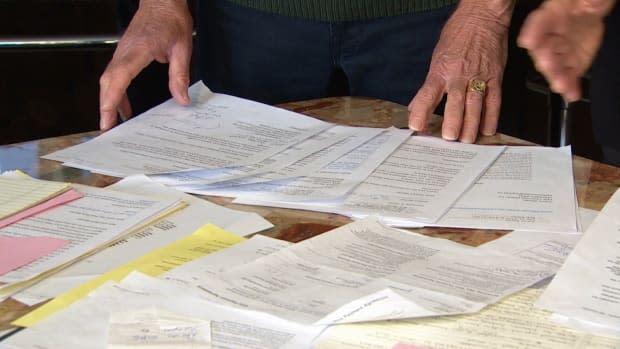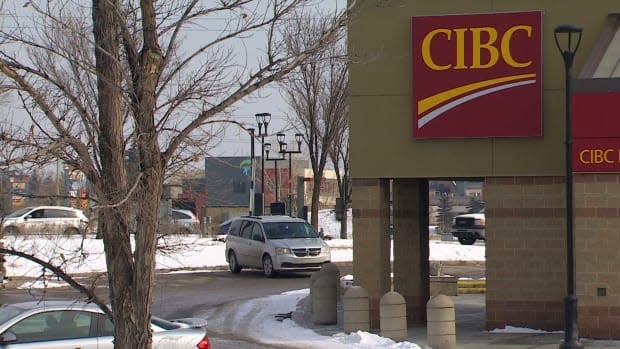$10,000 wire transfer disappears after bank puts it in wrong account

It's advertised as a safe and reliable way to send money, but an Ontario couple says the $10,000 wire transfer they sent their adult son was deposited into a stranger's account, then disappeared.
Barbara and Robert Behan wanted to help their son and his young family finish the basement in their home, so they sent the cash as a Christmas gift.
The transfer was sent from the couple's TD Bank account in Penetanguishene, Ont., on Dec. 21, to a CIBC branch in Calgary where their son has been banking for decades. But the money never showed up in his account.
Weeks later, CIBC told the Behans the money was gone — deposited into someone else's account the day it was sent — and that the account holder had withdrawn all $10,000 the next day, then shut the account down.
"It's inconceivable. Apparently this person had the exact same account number as our son," Barbara said.
"But they [CIBC] never matched the name of the account number to our son's name. They just put it into the wrong person's account. Nobody checked it."
CIBC says clients can have identical account numbers. It's another set of numbers — the five-digit transit numbers that identify a specific branch — that differentiates between accounts.

All of this could have been prevented if banks had a better system in place to make sure wire transfers end up in the right place, says banking expert Werner Antweiler.
"It really points to the [issues] with the current system," said Antweiler, an associate professor at the Sauder School of Business at the University of British Columbia.
"A simple mistake can get compounded very quickly because once the money has left an account, it is not easy, or it's often impossible, to retrieve it … so that's really imperative to get the transfer information right."
After two months of battling the banks, CIBC's ombudsman decided the bank was not at fault but offered the couple half of their money back as a goodwill gesture.
The bank returned the entire amount after Go Public contacted it.
WATCH | Wire transfer goes missing:
'Many sleepless nights'
Until then, the Behans say they spent "many sleepless nights" wondering if they'd ever see their money again.
"I worried constantly. I said to all the bank managers and everybody we've been in touch with, 'If this was your $10,000, would you be so laid-back about it?' It's $10,000. It's not a $1.50. It's hard-earned money," Barbara said. The couple says they were bounced back and forth between the two banks, with neither taking responsibility.
TD told the couple the missing funds were CIBC's fault — because it put the money into someone else's account after TD had successfully transferred it.
CIBC's ombudsman blamed the Behans, telling them that, instead of providing the transit number for their son's Calgary branch, they should have given TD the one for the Burlington, Ont., location where he first opened his account decades ago.
"We encourage clients to double-check this information when sending payments to ensure the funds are delivered to the intended recipient," wrote CIBC spokesperson Trish Tervit in an email to Go Public.
The couple says any problem should have been flagged and the money returned.
"It never should have reached the point that it did," Barbara said.

Prone to errors
Such errors are a direct result of Canada's flawed wire transfer system, says Antweiler — a system, called Lynx, that's prone to mistakes even though it was launched just last September. The majority of banks operating in Canada use Lynx, including CIBC, with a few exceptions.
"There are a great number of errors that happen when forms are filled out [and] the slightest error can lead to these kinds of situations where people are out of pocket, often quite deeply out of pocket," he said.
Lynx is only used in Canada. It's owned and operated by the non-profit Payments Canada, which is governed by organizations including the chartered banks and the Bank of Canada. It's in charge of almost all the systems (including debit, cheques and wire transfers — but not credit cards) used to make payments or otherwise send money.
More than 11 million transactions valued at $126 trillion were processed between financial institutions in 2021, including international payments, according to Payments Canada.
Lynx doesn't require banks to match the account number with the name of the account holder — and Antweiler says most banks don't — which increases the chance of errors like what happened to the Behans.

"We need to allow Canadians to transfer money more easily from bank to bank … a system that is not as error-prone, where if a few characters are wrong, the money ends up in the wrong place," he said.
Lynx replaced the Large Value Transfer System (LVTS) that had been in place for more than 20 years, according to the Payments Canada website. It calls Lynx "another milestone in payments innovation."
There is a solution, says Antweiler, pointing to other countries that use the International Bank Account Number (IBAN) system.
Unlike Lynx — which uses a three-digit bank code, a five-digit transit code and the account number — IBAN uses a lengthy alphanumeric code that allows its built-in error detection to flag problems, leaving little room for human error.
"That means if there's any error, like a number transposed or digit missing, [the transfer] would not work," Antweiler said.
As of January, 79 countries were using the IBAN system, including countries in the EU, Middle East, North Africa and the Caribbean.

Go Public asked five of Canada's major banks, Finance Canada and Payments Canada for statistics on wire transfer errors, but none made the information available.
The Behans say a safer, more reliable system is needed.
"We discovered during this time that our banking system, our banks, do not talk to each other. They do not work together. They don't have the same wire transfer forms. They don't communicate back and forth," Robert said.
"The thing we are saying is, how are [the banks] going to correct it in the future so it doesn't happen to anybody else?"
Go Public asked Payments Canada about the problems with Lynx and if it's considering changing to the IBAN system, but it didn't answer the questions.
Submit your story ideas
Go Public is an investigative news segment on CBC-TV, radio and the web.
We tell your stories, shed light on wrongdoing and hold the powers that be accountable.
If you have a story in the public interest, or if you're an insider with information, contact GoPublic@cbc.ca with your name, contact information and a brief summary. All emails are confidential until you decide to Go Public.
Read more stories by Go Public.


